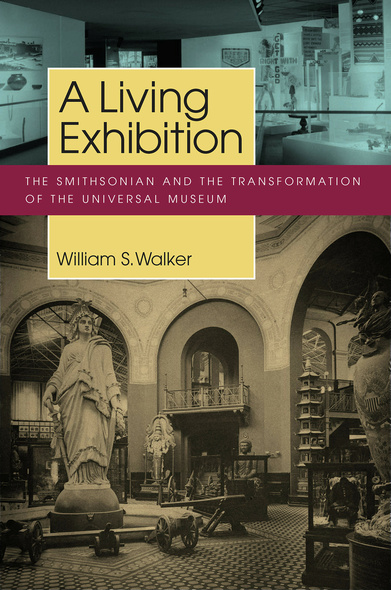
304 pages, 6 1/8 x 9 1/4
20 b&w illus.
Paperback
Release Date:15 Jul 2013
ISBN:9781625340269
A Living Exhibition
The Smithsonian and the Transformation of the Universal Museum
University of Massachusetts Press
Since its founding in 1846 "for the increase and diffusion of knowledge," the Smithsonian Institution has been an important feature of the American cultural landscape. In A Living Exhibition, William S. Walker examines the tangled history of cultural exhibition at the Smithsonian from its early years to the chartering of the National Museum of the American Indian in 1989. He tracks the transformation of the institution from its original ideal as a "universal museum" intended to present the totality of human experience to the variegated museum and research complex of today.
Walker pays particular attention to the half century following World War II, when the Smithsonian significantly expanded. Focusing on its exhibitions of cultural history, cultural anthropology, and folk life, he places the Smithsonian within the larger context of Cold War America and the social movements of the 1960s, '70s, and '80s. Organized chronologically, the book uses the lens of the Smithsonian's changing exhibitions to show how institutional decisions become intertwined with broader public debates about pluralism, multiculturalism, and decolonization.
Yet if a trend toward more culturally specific museums and exhibitions characterized the postwar history of the institution, its leaders and curators did not abandon the vision of the universal museum. Instead, Walker shows, even as the Smithsonian evolved into an extensive complex of museums, galleries, and research centers, it continued to negotiate the imperatives of cultural convergence as well as divergence, embodying both a desire to put everything together and a need to take it all apart.
Walker pays particular attention to the half century following World War II, when the Smithsonian significantly expanded. Focusing on its exhibitions of cultural history, cultural anthropology, and folk life, he places the Smithsonian within the larger context of Cold War America and the social movements of the 1960s, '70s, and '80s. Organized chronologically, the book uses the lens of the Smithsonian's changing exhibitions to show how institutional decisions become intertwined with broader public debates about pluralism, multiculturalism, and decolonization.
Yet if a trend toward more culturally specific museums and exhibitions characterized the postwar history of the institution, its leaders and curators did not abandon the vision of the universal museum. Instead, Walker shows, even as the Smithsonian evolved into an extensive complex of museums, galleries, and research centers, it continued to negotiate the imperatives of cultural convergence as well as divergence, embodying both a desire to put everything together and a need to take it all apart.
A Living Exhibition offers new insight into the workings of the Smithsonian Institution, putting it into the context of the history of ideas. William Walker provides a new coherence to the institution's history, making sense of its recent decades as a part of a century-long debate over the proper balance of universalism and specificity.'—Steven Lubar, coauthor of Legacies: Collecting America's History at the Smithsonian
'Walker's exploration of the Smithsonian's attempts to balance universality and specificity allow for an insightful discussion of the current debates engaging museum professionals today. Recommended.'—Choice
'William Walker's excellent new book offers an important narrative. . . . His compelling description of the complexities and rewards of representing multiculturalism is the important accomplishment of this book, one that readers of ethnic, cultural, and museum studies as well as historians will find as necessary reading.'—Journal of American History
'Walker's analysis contributes ably to the literature on the intersection of consensus and conflict and of the official and the vernacular, demonstrating how cultural pluralism and diversity have been and still are negotiated in real space in American life.'—Indiana Magazine of History
'Walker's book is a welcome addition to a small but growing literature on our national museum.'—American Historical Review
'With an eye for detail and for a good story, Walker makes connections with contemporary popular culture, political change, and social context, and in doing so provides a new understanding of the road the Smithsonian traveled towards those controversial exhibitions that attracted so much comment at the end of the century. . . . A Living Exhibition is a considerable achievement.'—Register of the Kentucky Historical Society
'Even readers unconcerned with Smithsonian politics will find themselves engrossed by the angry back-office memos . . . Walker's account benefits from the distance a younger scholar, armed with historical curiosity and formidable research skills can bring to a subject that has historically concealed its internal conflicts and complexities behind a studied 'exhibition' of consensus.'—Winterthur Portfolio
William S. Walker is assistant professor of history, Cooperstown Graduate Program, SUNY Oneonta.









